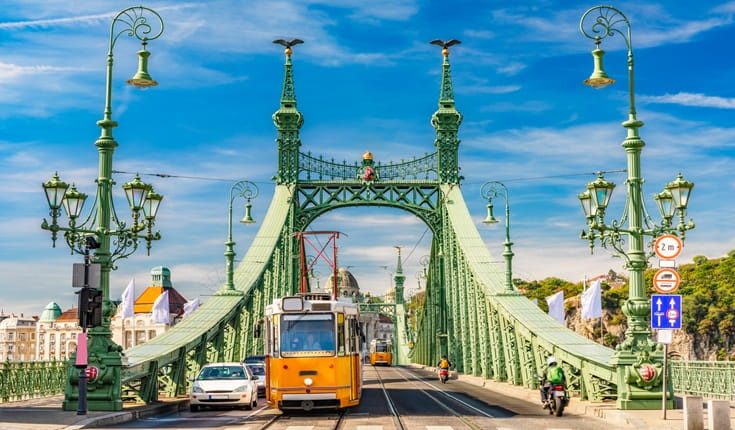NMAT: How the Exam Unlocked my Path to a Top Master in International Business

Antony Patiño, an international student from Arequipa in Peru, had always dreamed of building a successful international career. With keen attention to detail, a passion for the business world, and experience in both sustainability consulting and corporate sustainability, this vision drove him to seek opportunities to enhance his skillset and increase his employability.
 In 2024, Antony travelled from his home country to pursue what he saw as his greatest opportunity yet—a Master (MSc) in International Economy and Business at Corvinus University in Budapest, Hungary.
In 2024, Antony travelled from his home country to pursue what he saw as his greatest opportunity yet—a Master (MSc) in International Economy and Business at Corvinus University in Budapest, Hungary.
We sat down with Antony to discuss how he approached his final challenge before admission: The NMAT Exam. He shared how the challenging test played a pivotal role in his journey to becoming a master’s student, how he prepared, and his experience as an international student in Europe.
Q: How did you hear about the NMAT and what made you decide to take it?
A: I found out about the NMAT while applying to Corvinus University via the Stipendium Hungaricum Scholarship scheme.
To secure my place at the university, I learned that I had three options: GRE, GMAT, or NMAT. So, I analyzed the examination options, looking at the price first—because at the time I couldn't be sure I would get the scholarship—and I found out the NMAT was cheaper, and therefore far more accessible for me.
I also reviewed the content that would be covered, I felt comfortable that would have enough time to study and a good chance of achieving a good score.
Q: How did you hear about the scholarship, and what role did the NMAT play?
A: I knew about Corvinus University because I always looked at international rankings, including the QS Rankings for Subjects.
I researched AACSB universities in Hungary, and the only one that I saw at the time was Corvinus University, so it was the best option because the AACSB accreditation is one of the best ones for business studies.
I also knew about the scholarship, Stipendium Hungaricum, through the website of scholarships from my Peruvian government, which published the call for scholarships in Hungary.
It was later while revising the requirements for the scholarship, that I found out the NMAT was one of the options. I learned that you are evaluated by exam [performance] and are required to pass a threshold.
The scholarship also required an English certification, and I was pleased to discover that for Corvinus University the NMAT was also accepted as evidence of English proficiency. This really helped streamline the process.
Q: How did you prepare for the NMAT?
A: I studied for one month using the free study material—and I found that this was enough.
I also made a conscious decision to study on my own, as I felt I could learn faster through individual lessons, reviewing theories, and practicing by myself.
It was admittedly challenging to find time to study, especially since in Peru we are expected to work 48-hours per week. Most of my studying took place on weekends, but that was okay because I was studying finance and mathematical topics that piqued my interest, which helped keep me motivated.
Q: What advice would you give to others taking the NMAT? Anything you wish you had done differently?
A: Consider the timing of your examination. I selected a night-time slot, which was probably not the best thing to do. I was tired and it definitely made it more difficult.
I advise giving yourself more time to study so you can reduce the burden of reading the material and practicing in a short space of time. However, if you do not have much time to prep, I recommend downloading the free materials provided by GMAC and practising the full tests ahead of the real exam.
Q: What attracted you to studying an MSc in International Economy and Business?
A: I was attracted to the program because I wanted to enhance my economic skill set. In Peru, I first worked as a sustainability consultant and then in corporate sustainability.
I lacked a formal economic background as I studied management, so I wanted to consolidate my knowledge in international economy with an orientation to pragmatism in business.
A Master's in International Economy and Business offered a great way to fill this gap while also fulfilling my passion for finance, corporate finance, and investment banking.
Q: What advice would you give to students studying abroad, and why do you think it's beneficial to make the move?
A: There are so many benefits to studying abroad. Firstly, you get to experience another culture. It is also great for networking and meeting people. You can make connections that are going to help with your employment prospects.
In my case, Hungary also offered better access to security and safety, along with the opportunity to practice my English.
My scholarship includes compulsory Hungarian language lessons, so I am slowly overcoming this obstacle and learning to appreciate even more the culture through the appreciation of its language.
Q: What are your career goals following your master's?
A: I hope to do an internship in finance, and then I would like to move to somewhere in Spain, likely Madrid or Barcelona—firstly, because I have the advantage of speaking the language, but also because I can see myself potentially doing an MBA at IESE Business School. In the long term, however, I would like to establish a career in investment banking or private equity.
Find out more about how you can apply for the NMAT exam by visiting NMAT by GMAC.



